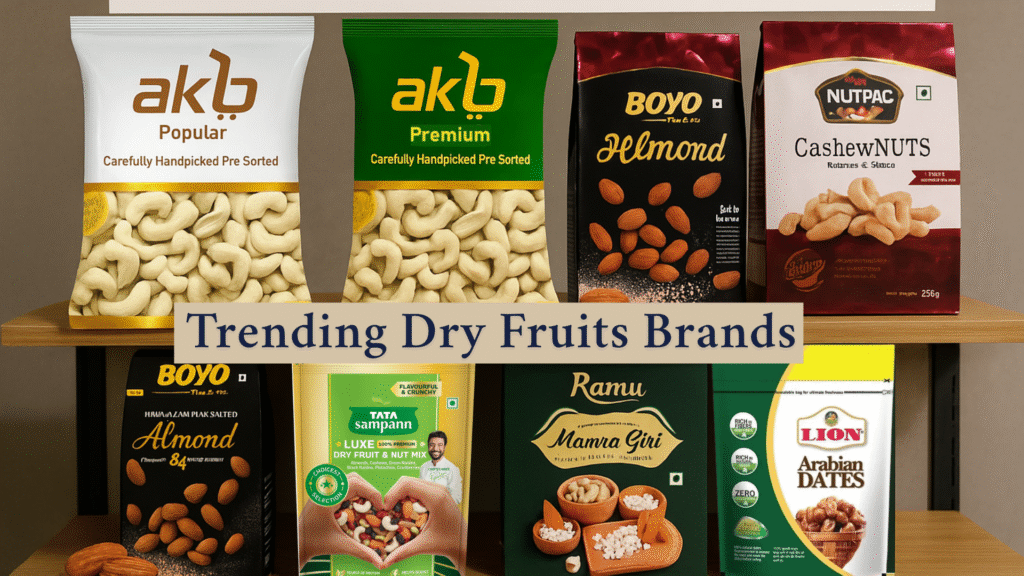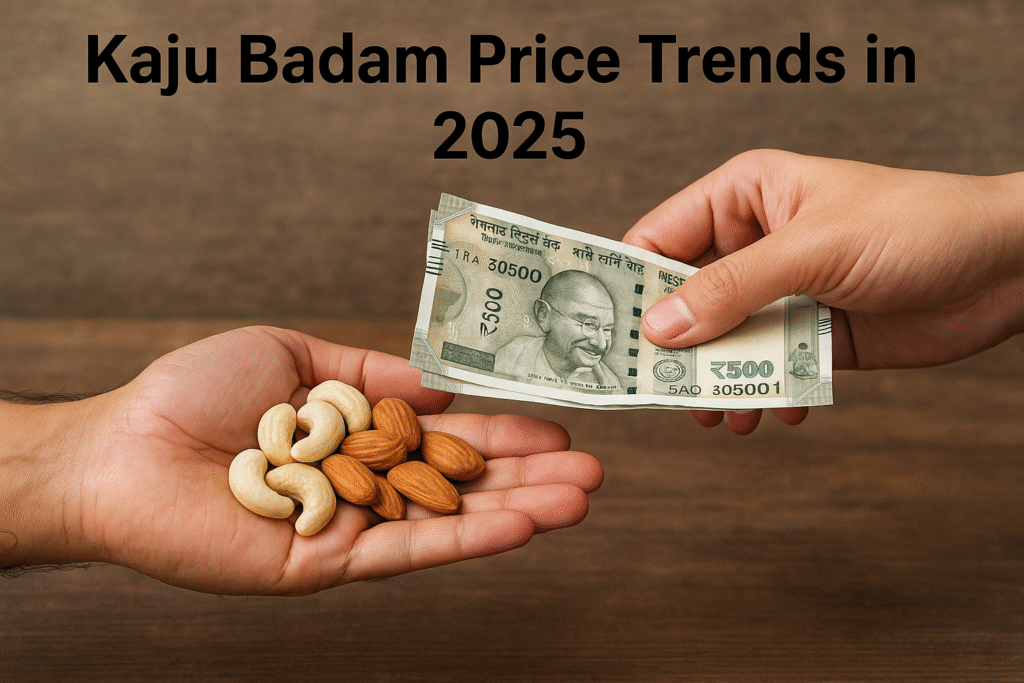Explore Delhi’s Dry Fruit Market and Smarter Shopping Tips
Dry fruits, especially kaju (cashews) and badam (almonds), have long been staples in Indian households. Whether used in traditional sweets, savory dishes, or enjoyed as healthy snacks, their demand remains high throughout the year, peaking during festivals and wedding seasons. In 2025, as consumers become more health-conscious and digitally connected, kaju and badam price trends are shifting, especially in major metros like Delhi, where the online dry fruit market is outpacing offline retail in convenience, price, and quality transparency.
Let’s dive into what’s driving the price trends of kaju and badam this year, how Delhi’s market is responding, and how smart buyers can ensure they get top-quality dry fruits at the best value.
1. Kaju and Badam Prices in 2025: A Quick Snapshot
As of mid-2025, the average retail prices in Delhi are as follows:
- Kaju Price in 2025
- Whole premium grade: ₹850–₹950/kg
- Economy/broken cashew (Tukda Kaju): ₹580–₹720/kg
- Badam Price in 2025
- California Almonds: ₹680–₹780/kg
- Afghani/Iranian Premium Almonds: ₹850–₹1,000/kg
These prices vary based on the origin, size, grade, processing method (raw/roasted), and brand.
What’s Influencing These Prices in 2025?
- Import Costs & Global Demand: India still relies on imports, especially from California badam and Vietnam/ Goa kaju. Currency fluctuations and rising freight charges post-pandemic recovery have mildly pushed prices up.
- Climate Impact: Droughts and unexpected weather conditions in almond-growing regions have slightly reduced supply.
- Increased Consumption: The rise of protein-rich and low-carb diets has made almonds and cashews a daily essential for health-conscious buyers, not just festive luxuries.
2. Delhi’s Dry Fruit Scene: Online vs. Offline
Delhi, being a hub of gourmet food trends and an evolving digital marketplace, shows a strong shift in consumer preference from offline kirana stores to online grocery platforms.
Why Online is Winning in Delhi:

- Better Prices:
Online platforms offer frequent discounts up to 20–40% on dry fruits due to bulk procurement and seasonal campaigns. For instance, cashews that cost ₹950/kg in a retail store may be listed for ₹799/kg online with free delivery and easy returns. - Convenience & Speed:
Delhi’s fast-paced lifestyle means people prefer ordering from apps that deliver within hours rather than visiting crowded markets like Khari Baoli or INA Colony in Delhi. - Transparency in Quality:
Apps display product origin, grade, and packaging date, helping buyers make informed decisions. Offline vendors may not always disclose this unless asked. - Better Storage & Hygiene:
Online-sold dry fruits are usually stored in airtight, moisture-proof, nitrogen-flushed packs, preserving freshness. Street shops may be exposed to humidity and dust in selling dry fruits.
3. How to Check the Quality of Dry Fruits Before Buying
Whether you’re shopping online or offline, checking the quality of kaju and badam is crucial. Here are some smart tips to identify premium quality:
For Kaju (Cashews)
✅ Color & Size:
Choose cashews that are creamy white in color and uniform in size. Premium grades like W320 (whole, 320 pieces per pound) are smoother and sweeter.
✅ Crunch Test:
High-quality cashews have a firm, dry crunch, not soft or rubbery. If they’re chewy, they might be old or poorly stored.
✅ Odor Check:
Cashews should smell nutty and clean. Any sour or stale smell means they’ve gone rancid.
✅ Surface Texture:
Look for a smooth surface without black spots or cracks. Broken pieces are cheaper but best for cooking.
For Badam (Almonds)
✅ Uniformity & Shine:
Almonds should be uniform in shape, with a light brown, glossy finish. Shrivelled ones indicate poor quality or age.
✅ Taste & Aroma:
A high-quality almond is slightly sweet with no bitterness. A bitter taste can indicate aflatoxin contamination.
✅ Water Test (at home):
Soak a few almonds overnight. If the peel comes off easily and the almond remains crunchy inside, it’s fresh and unadulterated.
✅ Check for Additives:
Avoid almonds that have been polished with oil or artificial gloss, common in unbranded offline stock.
4. Pro Tip: Buy in Small Packs or Family Packs Online

Online stores often sell 250g or 500g packs, perfect for small families or trial purchases. Once you trust a brand or seller, opt for combo packs that include kaju, badam, raisins, and more for a better per-kg price.
Many online and offline grocery stores offer curated dry fruit gift packs under their in-house brands, which include premium quality Dry Fruits, pre-sorted by grade, packed hygienically, and stored in climate-controlled environments. Their orders are delivered within 24 hours with full price transparency.
5. Conclusion: Buying Smart in 2025
With inflation, climate unpredictability, and global trade hiccups influencing dry fruit prices, Delhi buyers need to shop smart, not just cheap. Trust brands that show you what you’re buying—grade, packaging, discounts, and origin.
Kaju and Badam aren’t just snacks; they’re long-term health investments. Choosing the right quality at the right price, especially online, will help you save money while enjoying nutrition-rich ingredients daily.
Quick Summary: What You Should Know in 2025
| Point | Insight |
| Prices | Kaju: ₹850–₹950/kg, Badam: ₹680–₹1,000/kg in Delhi and NCR |
| Best Buying Mode | Online > Offline for price, hygiene, and transparency |
| Brands to Trust | Aap Ka Bazar, Boyo, Nutpac, Tata Sampann, and more |
| Check Quality | Smell, shape, taste, color, and packaging type |
| Smart Tip | Buy smaller packs online to test quality first |
Ready to shop smarter for your family?
Explore offline markets or online platforms for premium kaju, top-quality badam, and other dry fruits, because including dry fruits in daily meals can be a healthy decision.



